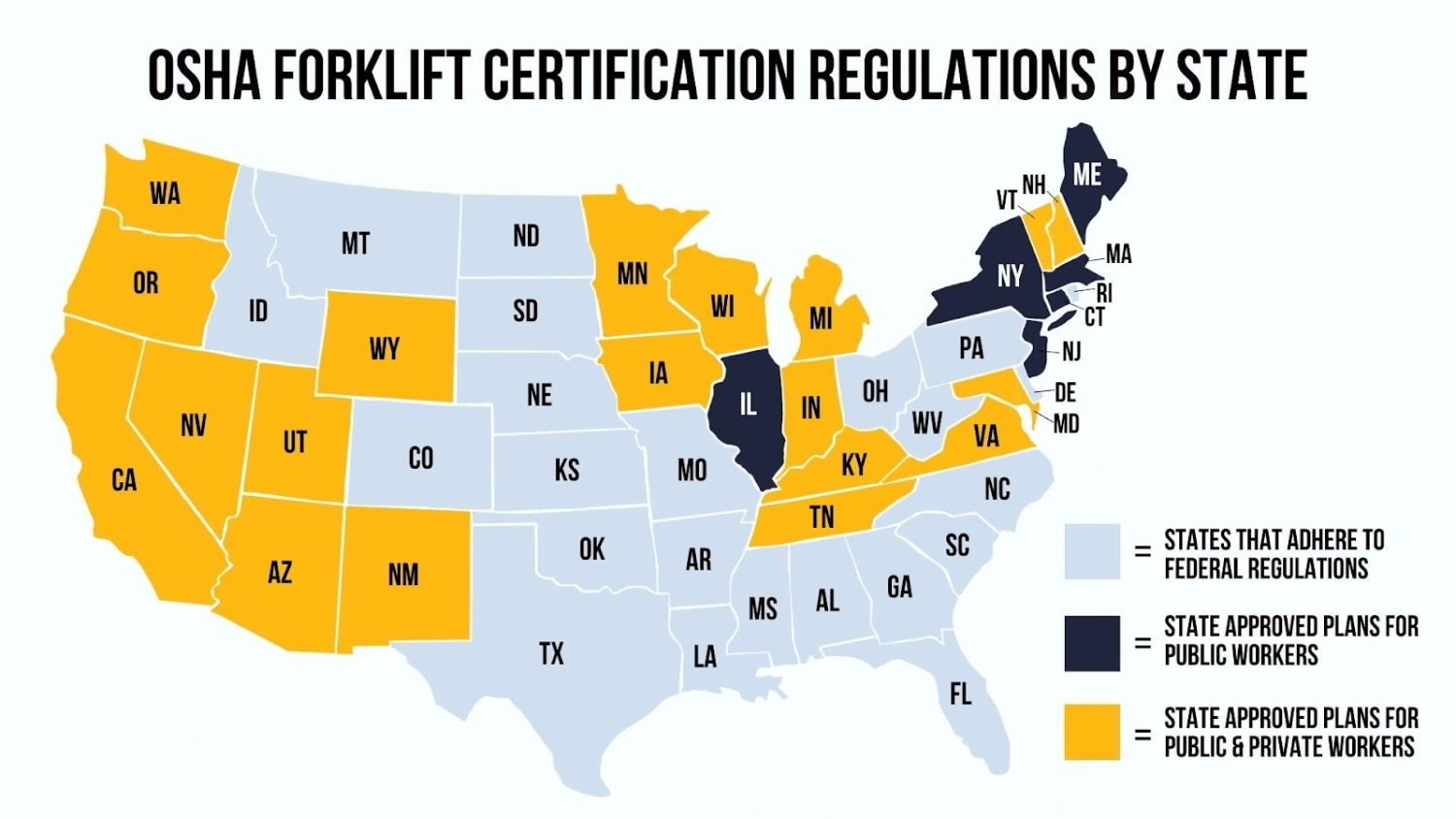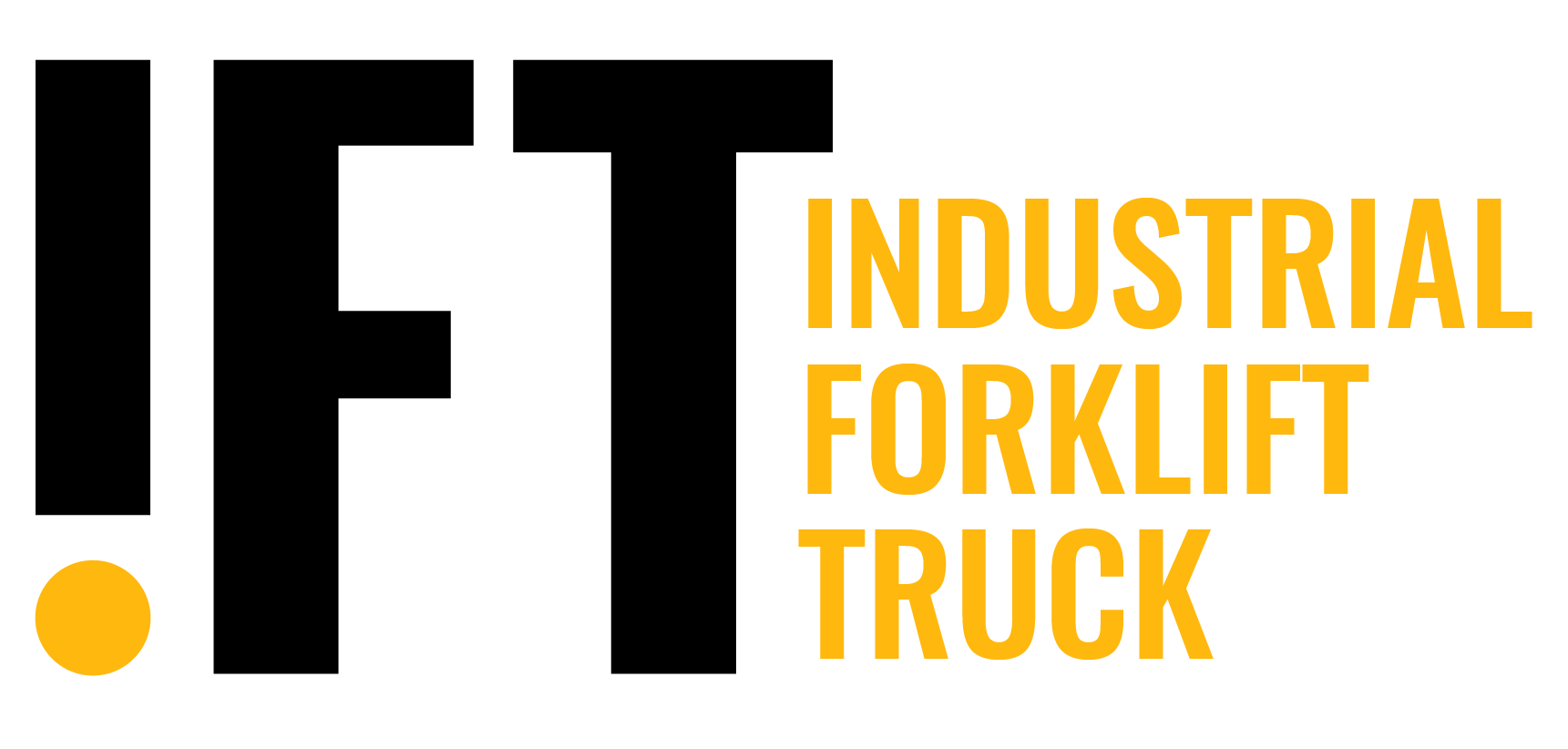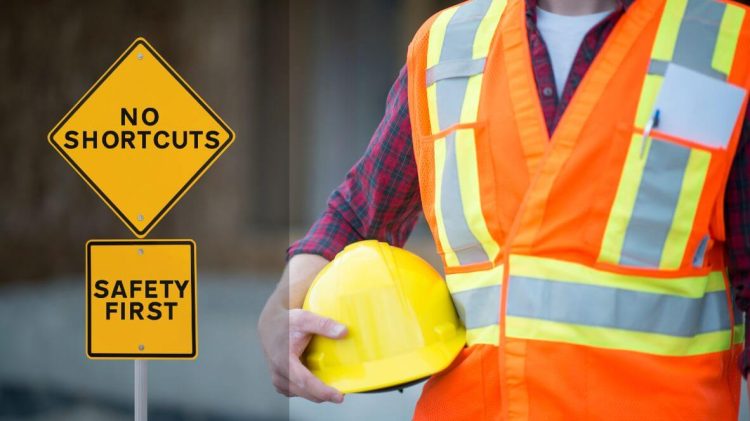Quick Summary
Federal OSHA standards mandate that all forklift operators obtain a certification before handling any powered industrial trucks, but some states enforce additional regulations that drivers must adhere to.
Ignorance is no excuse for violating standards, so knowing your local codes is key to compliance. This resource breaks down the forklift certification requirements by state. Use it as a quick-reference guide to keep your facility and forklift operators compliant.
Federal OSHA Requirements
All forklift operators in the U.S. must comply with OSHA Standard 29 CFR 1910.178, which states all handlers must be forklift certified for the type of equipment they are operating. Each training includes 3 parts: a formal education portion, hands-on training, followed by a performance evaluation.
All employers are legally responsible for ensuring their personnel are properly trained and certified to use the forklift equipment in the facility.
Federal vs. State Plans
While OSHA sets the minimum forklift safety and certification standards at the national level, states are encouraged to create their own plans to keep workers safe in their unique environments.
All state plans must be approved by the federal OSHA in order to take effect. Only plans that are “at least as effective” as national regulations are approved by OSHA, so many state-level plans are usually more strict.
Once approved, enforcement responsibilities are transferred to the state agency to police.
Employer Responsibilities by State
No matter where you operate, all employers have a responsibility to ensure their forklift training meets OSHA standards. Employers must conduct evaluations for each type of forklift that will be used on site, and should keep a record of all operators’ formal and practical training.
Having documentation and training logs for each operator on file can help protect your business if and when you are audited by the state or federal OSHA agency.
Private vs. Public Sectors
Some forklift certification requirements by state can only be enforced for jobs that operate within the public sector. In those states, private workers default to federal OSHA regulations.
Below is a breakdown of the different state-approved plans that are enforced in both public and private, or just public companies:
OSHA-Approved State Plans For Private & Public Workers
The following states have OSHA-approved forklift certification requirements that cover private and public workers:
| State | State OSHA Agency |
|---|---|
| Alaska | AKOSH |
| Arizona | ADOSH |
| California | Cal/OSHA |
| Hawaii | HIOSH |
| Indiana | IOSHA |
| Iowa | Iowa OSHA |
| Kentucky | Kentucky OSH |
| Maryland | MOSH |
| Michigan | MIOSHA |
| Minnesota | MNOSHA |
| Nevada | Nevada OSHA |
| New Mexico | NM OSHA |
| North Carolina | NCDOL |
| Oregon | Oregon OSHA |
| Puerto Rico | PROSHA |
| South Carolina | SC OSHA |
| Tennessee | TOSHA |
| Utah | Utah Administrative Code |
| Vermont | VOSHA |
| Virginia | VOSH |
| Washington | WA OSHA (DOSH) |
| Wyoming | WY OSH |
OSHA-Approved State Plans For Private Workers
The following states have OSHA-approved forklift certification requirements that cover only public workers:
| State | State OSHA Agency |
|---|---|
| Connecticut | CONN-OSHA |
| Illinois | IL OSHA |
| Maine | MEOSH |
| Massachusetts | DSL |
| New Jersey | NJ PEOSH |
| New York | NY PESH |
Private workers in these states fall under the enforcement of the federal agency.
Federal OSHA-Regulated States
These states do not have state-approved forklift certification plans, and therefore, fall under review of the federal regulations:
- Alabama
- Arkansas
- Colorado
- Delaware
- Florida
- Georgia
- Idaho
- Kansas
- Louisiana
- Mississippi
- Missouri
- Montana
- Nebraska
- North Dakota
- Ohio
- Oklahoma
- Pennsylvania
- Rhode Island
- South Dakota
- Texas
- West Virginia
- Wisconsin
State-by-State Forklift Certification Chart

Certification Validity and Recertification Requirements
A forklift certification is valid for three years across all states, but recertification may be required sooner if:
- An operator is involved in an accident or near-miss crash
- Unsafe operation is observed
- A different type of forklift is introduced
- Workplace conditions change significantly
Can You Transfer Forklift Certification Between States?
If you’re moving from a federally-regulated state to another federally-regulated state, your forklift certifications will be valid across state lines as long as the original training met OSHA standards and the employee can pass a site-specific evaluation observed by the new employer.
If the new state is regulated by a state OSHA plan, you’ll have to work with your new employer or safety officer to pass any state-specific requirements before operating the equipment.
Industrial Forklift Truck: A Trusted Resource, Nationwide
Industrial Forklift Truck doesn’t provide training or certification, but we do help forklift operators and employers stay informed.
In addition to our educational resources, our online comparison tool helps compare forklift types by features, price, and best-use cases so you can find the right equipment for your business. Just answer a few questions about your use requirements, enter your zip code, and we’ll send you our top recommendations on equipment in your area!
Fill out the free surveyFAQ: Forklift Certification by State
Yes, forklift certification rules can vary by state. Some states adhere to federal OSHA programs and others have state-approved plans, which transfer the rights to regulation and enforcement to state OSHA agencies.
See the full breakdown of forklift certification requirements by state.
Yes, as long as the original certification met OSHA standards, but your new employer must still evaluate you on their site’s equipment. Additional training might be required if you’re moving from a federally-regulated state into a state-regulated.
The federal OSHA agency requires recertifications every three years, minimum. Some authorities may conduct audits more frequently, so keep documentation up to date.
No. We provide educational resources only — not training or certification services. But we do sell the equipment your employees will be handling. If you’re in need of some new machines to improve your warehouse operations, we’re here to help.
Start comparing rates for free today!

